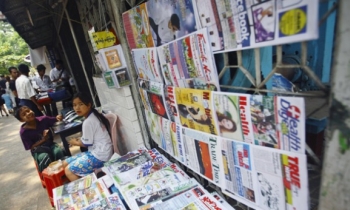Last Thursday, two men shot three bullets into Ratan Luwangcha, the General Secretary of the Manipur journalists’ union and bureau chief of a popular local newspaper, the Poknapham. He is in a critical condition, but at least he is still alive – unlike the three editors of Manipuri dailies who have been shot dead in the past few years.
Killing journalists seems to be becoming a bit of a fad with terrorists and criminals in India’s Northeast. On January 6, Prahlad Goala, a reporter with the Guwahati daily newspaper Asomiya Khabar was knocked off his scooter by a car and stabbed to death. He was returning home from work. Prahlad, who was only 33, left behind a wife and a 14-month-old daughter. He was working on stories related to corruption in the Forest Department at the time of his death. These two cases are only the tip of an iceberg of violence. There are many instances where intimidation – at times accompanied by bribery – alone suffices to silence people. The reporters involved stay alive, but journalism is a casualty.
That is why this issue is important. Most of us form our opinions about issues and events based on what is reported. If the only reportage that doesn’t get journalists into trouble is 'safe’ reporting, no hard truth or honest opinion will ever be printed or voiced. This could eventually be very bad news for democratic India. That’s because of the sort of people and groups who would then 'edit the editors’. It would be criminals and terrorists. Already, these sorts have a dangerously high influence on the media in conflict zones.
Every newspaper office in the North-east and Kashmir receives press releases from militant groups and their front organisations. Often, the press release is accompanied by a phone call.
Journalists, who work under an enormous range of pressures – find stories every day, report them accurately within deadlines, satisfy the subjective tastes of readers – are mostly 'regular’ people who just want to get on with their ordinary lives. They can do better jobs without any intimidation. The press fraternity therefore needs to stand up for their own in those forgotten places. Our friends there do an important job, for little recognition and often, for little pay. Perhaps not all of them are wonderful human beings. But that does not mean we can ignore their being killed.
What do you think would happen if a Delhi newspaper editor were shot at? Or the general secretary of the Press Club here were stabbed? Everything at the Centre is major. In the peripheries, out of sight and out of mind, a different set of standards for everything including the value of human lives, apply. This state of affairs cannot be allowed to continue. Because perceived neglect, in my opinion as someone from the North-east, is the single biggest emotion behind militancy. And because if you’re a journalist, tomorrow you could be reporting a story from there.









